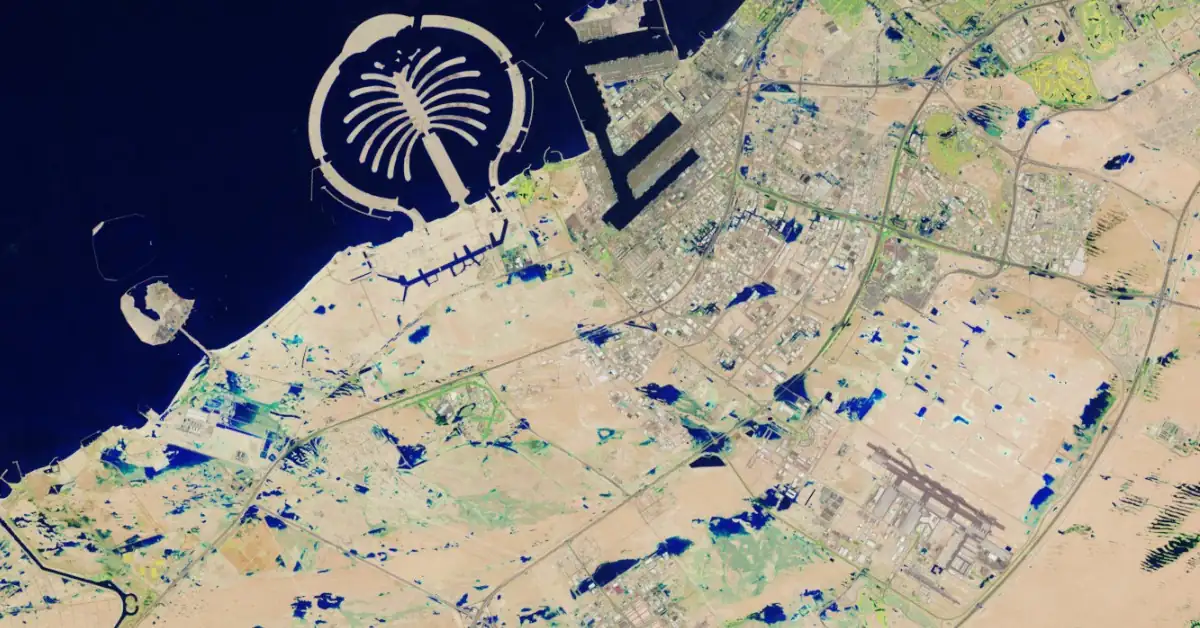Record rainfall in UAE triggers severe flooding and waterborne illness outbreak

On April 16, 2024, the United Arab Emirates experienced a historic weather event, receiving a year’s worth of rainfall in just 12 hours, leading to severe flooding across the nation, including disruptions at Dubai’s major international airport. Following the floods, health concerns have risen due to water contamination that has reportedly sickened residents with symptoms linked to contaminated water.
On Tuesday, April 16, the United Arab Emirates (UAE) faced a historic weather event, recording a staggering 142 mm (5.59 inches) of rainfall within a 12-hour period, significantly higher than the average annual rainfall.
The Khatm Al Shakla area in Al Ain recorded the highest rainfall, receiving 254.8 mm (10 inches) within 24 hours. This is the highest 24-hour rainfall in UAE since their record-keeping began in 1949. It’s also a figure that starkly contrasts with the UAE’s average annual rainfall of 140 – 200 mm (5.5 – 7.9 inches).
Dubai International Airport recorded 119 mm (4.7 inches) of rainfall, far surpassing the city’s annual average of 97 mm (3.8 inches) and the typical April rainfall of 8 mm (0.3 inches).
This extreme weather caused substantial flooding and led to significant operational disruptions at Dubai International Airport, affecting over 200 000 passengers.
The state-run WAM news agency described the rainfall as surpassing any prior recorded event since data collection began in 1949. Among the chaos, dramatic scenes emerged with residents resorting to jet-skiing on flooded streets, and luxury vehicles like Rolls-Royce cars being swept away by the floodwaters.
Following the floods, the UAE Health Ministry reported on April 23 that people across the nation had presented symptoms indicative of consuming contaminated water.
تنويه من #بلدية_العين لتجمعات المياه و البرك الراكدة الناتجة عن المنخفض الجوي
— بلدية مدينة العين (@alainmun) April 23, 2024
Public Announcement from #alain_municipality regarding the water pools and stagnant ponds resulting by the rainstorm pic.twitter.com/oBwb7uetgK
Although specific contaminants were not identified, the affected individuals exhibited respiratory and skin infections, leading to increased hospital visits.
Health facilities like NMC Specialty Hospital in Al Ain reported a rise in patient visits, from an average of 25 – 30 to 40 daily, with conditions predominantly related to the flood.
In response to the health risks posed by stagnant water, local authorities, including Al Ain Municipality and the Dubai Health Authority, issued multiple advisories. Residents were urged to avoid contact with stagnant water and were provided guidelines to minimize exposure to potentially harmful substances and mosquito-borne diseases.
Medical professionals noted a significant increase in respiratory infections and exacerbations of chronic conditions such as asthma and chronic obstructive pulmonary disease following the floods. The surge in health issues has also led to a higher demand for medications, with pharmacies like Life Pharmacy intensifying efforts to meet the increased needs.
The UAE regularly engages in cloud seeding operations to enhance its limited groundwater resources. However, this incident has raised questions about the timing and impact of such interventions on the severe weather experienced. While authorities deny usage of cloud seeding during the storms, flight-tracking data analyzed by The Associated Press showed one aircraft affiliated with the UAE’s cloud-seeding efforts flew around the country Sunday — two days before the event.
The same weather system impacted Oman, leading to 19 fatalities.
References:
1 UAE: Don’t jet-ski, swim or play in stagnant water, residents told as authorities warn of health risks – Khaleej Times – April 23, 2024
2 Dubai reports mystery illness linked to severe floods that hit region – Independent – April 25, 2024
3 Historic rainfall in UAE results in major flooding, traffic chaos in Dubai – The Watchers – April 17, 2024
Featured image credit: USGS/Landsat 9 — OLI-2

Commenting rules and guidelines
We value the thoughts and opinions of our readers and welcome healthy discussions on our website. In order to maintain a respectful and positive community, we ask that all commenters follow these rules.